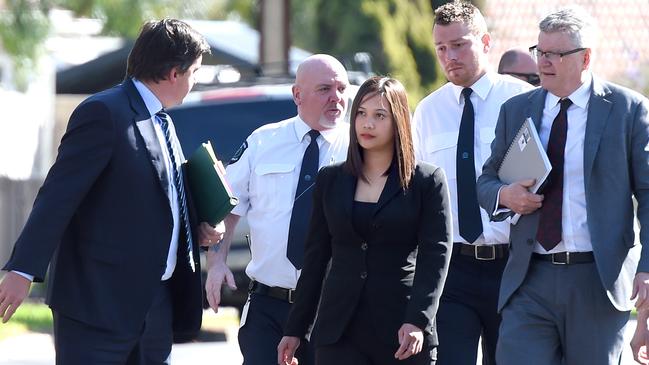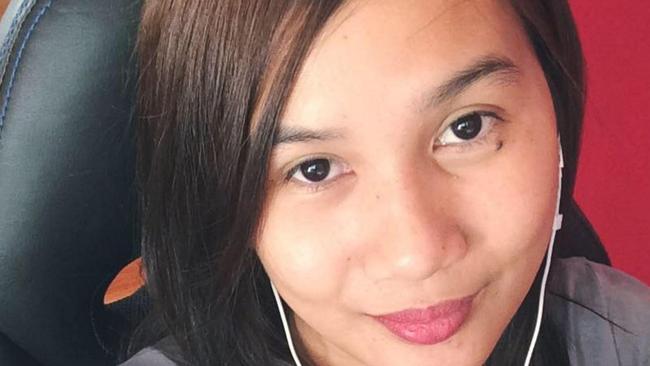Jurors in two-month-long Caroline Dela Rose Nilsson murder trial could reach no verdict
The near 40-hour deliberation in the Caroline Dela Rose Nilsson murder trial, which resulted in a hung jury, has cast a new light on the SA’s jury system.

South Australia’s jury system has been thrust into the spotlight, after jurors in the Caroline Dela Rose Nilsson murder trial returned a hung verdict following more than seven weeks of evidence and nearly 40 hours of deliberations.
About 8.30pm on Tuesday night, after a fifth day deciding a verdict, jurors passed a note to Justice Chris Bleby to say that, despite their best efforts, they could not reach an answer.
Justice Bleby discharged the jury of eight women and four men, and thanked them for their service over the preceding two months.
It is believed to mark the end of one of the longest deliberation periods in the state’s recent history.
It took jurors in the Snowtown murders case seven days to return their verdicts after an 11-month-long trial in 2003.
A spokesperson for Director of Public Prosecutions, Martin Hinton, said a decision was yet to be made on whether the case would be re-tried, and the matter will be considered in the coming weeks.
The matter is listed to come before the court for a hearing next Thursday, while lawyers for Nilsson have indicated she could also make a bail application next week.

The breakdown of opinions within a jury room - how many individuals believed Nilsson was guilty or otherwise - is not known.
Deliberations are kept so secret that a High Court decision in 2016 ruled that, even in a potential miscarriage of justice, the court may not ask individual members how they voted.
In the case of this trial, jurors were first directed that any verdict reached must be unanimous, but Justice Bleby later said a not guilty verdict may be returned if a majority of 10 or more jurors could agree to do so.
The group had heard more than seven weeks of evidence before they retired to consider their decision.
They were empanelled ahead of the trial’s opening on August 25, and were then required to attend court four or five days a week as directed by the judge.
Because of the length of the trial, Justice Bleby empanelled more than the required 12 jurors to account for the possibility that some may need to be discharged before the end of the process.

At the end of the evidence, a ballot was conducted to finalise the group that would be involved in deciding a verdict.
Usual sitting hours for jurors on a trial are between 10am and 4.30pm, with a break for lunch at 1pm, and a shorter morning and afternoon break.
However, when a jury is deciding a verdict they may stay past that time, and are provided with lunch and dinner to ensure they do not need to leave the jury room.
In this trial, jurors parted ways at the end of the first four days of deliberations on the promise that they would not discuss the case with others.
They elected to stay through dinner on the fifth night, and returned their decision about an hour afterwards.
During the trial, it had been alleged that Nilsson bludgeoned her mother-in-law to death, then told police they had been the victims of a violent home invasion.
But defence lawyers argued the pair had a good relationship, and their client had no motive to commit the crime.

Jury duty in South Australia
Who can be called?
South Australia has three districts where jury trials are held: Adelaide, Mount Gambier and Port Augusta.
Voters aged between 18 and 70 are selected at random based from the electoral roles within those districts. A person cannot volunteer to do jury duty.
Who can be excused?
There are a number of reasons why someone called for jury duty could be ineligible. Reasons for exclusion from a jury include medical conditions that could affect their service (for example, hearing loss), or people who do not speak English to a level that would allow them to properly participate.
Other people can be ruled ineligible because their profession, including police officers, practising lawyers, courts administration staff and members of parliament.
Jurors can be passed over at the empanelment stage of a trial, too.
As names are pulled from a ballot box at the beginning of a trial, prosecution and defence lawyers may refuse up to three jurors each without giving a reason.
How long does it take?
Those called for jury service are assigned to a court sitting month, which last between four and five weeks.
However, if they are assigned to a trial that has not finished by the end of that time, such as the Nilsson trial, they are required to continue until it is complete.
Is there payment involved?
Yes. Everyone who does jury duty is paid $20 a day plus a travel allowance for each kilometre travelled to and from the court.
On top of that, jurors or their employers can claim for monetary loss up to a certain amount if they lose wages by attending jury duty, or have to pay someone to work in their business while they are away.


